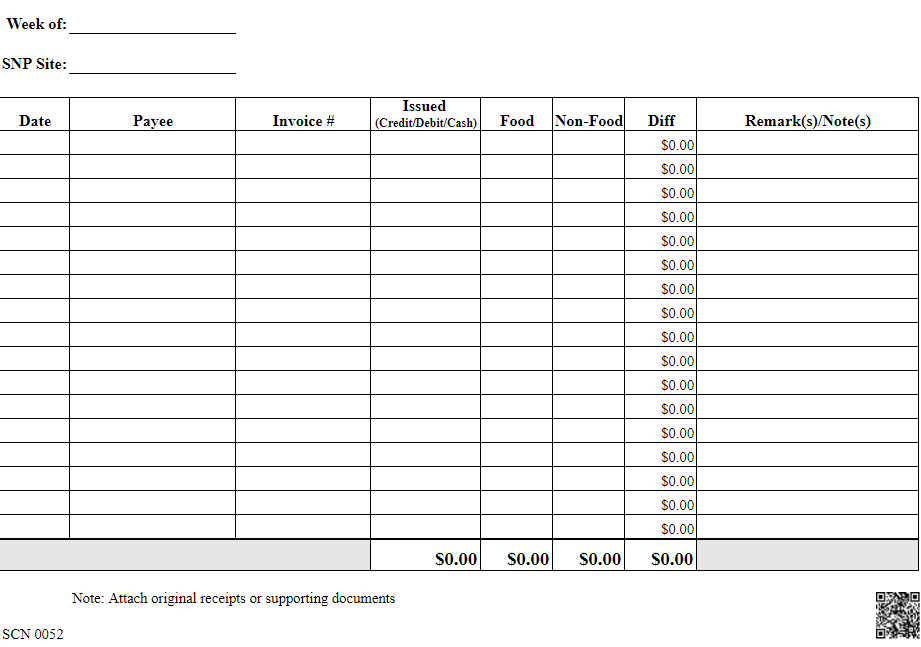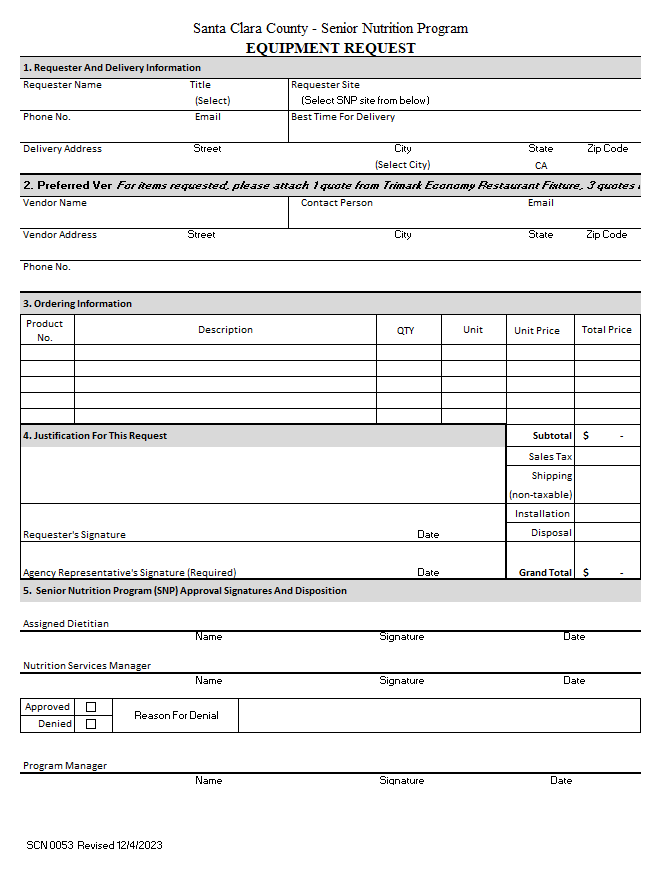Purchasing
Food Procurement Requirements
The following standards are recommended for the purchasing and receiving of food at congregate meal sites.
- Food Quality and Sources
- All foods shall be of good quality and shall be obtained from sources which conform to federal, state, and local regulatory standards for quality, sanitation, and safety.
- Food stored or prepared in a private home shall not be used.
- Milk
- Milk and approved milk substitutes shall be purchased from a reliable source whose standards of quality, sanitation, and safety comply with the California Food and Agricultural Code.
- All milk and approved milk substitute products used and served shall be pasteurized.
- Canned Foods
- Food in hermetically sealed containers shall be processed in a licensed establishment. No home-canned food shall be used.
- Food from broken containers; unlabeled, rusty, or leaking cans; or cans with side seam dents, rim dents, or swells shall not be used.
- Cost Analysis
A comparative cost analysis shall be performed either by the provider or its group purchasing organization on an ongoing basis to obtain the highest quality food for the lowest price available. - Receipt of Food
- Food shall be inspected as soon as practicable upon receipt and prior to any use and storage.
- Food shall be accepted only if inspection conducted upon receipt determines that the food satisfies all of the following:
- Is prepared by and received from approved sources.
- Is received in a wholesome condition.
- Is received in packages that are in good condition and that protect the integrity of the contents so that the food is not exposed to adulteration or contaminants.
- Is in containers and on pallets that are not infested with vermin or otherwise contaminated.
- Potentially hazardous food shall be inspected for signs of spoilage and randomly checked for adherence to the temperature requirements specified in CalCode, Section 113996.
- Potentially hazardous hot food items shall be at a temperature of 135°F or above.
- Potentially hazardous cold food items shall be at or below 41°F.
- The following foods may be held at or below 45°F:
- Raw shell eggs.
- Pasteurized milk and milk products in original, sealed containers.
- Food that is labeled frozen and shipped frozen shall be received frozen and accepted only if there are no visible signs of thawing or refreezing.
- Upon receipt, potentially hazardous food shall be free of evidence of previous temperature abuse.
Guidelines for Tracking Raw Food and Non-Food Costs
All purchases of raw food, cleaning, and paper supplies shall be accounted for by invoices or receipts at the time of purchase. It is recommended that the Weekly Posting Sheet (Form: Weekly Purchase Posting Sheet) be used to track and maintain weekly or monthly purchases.
- Posting Raw Food and Non-Food Cost
- Product purchases shall be made by the Site Manager or site staff.
- Invoices or receipts of all purchases shall be obtained at the time of transactions.
- Amounts purchased shall correspond with the certified menu, daily usage, and the number of participants served.
- Posting purchases shall be done on a weekly basis preferably using the Weekly Posting Sheet.
- Raw food purchases shall be recorded separately from non-food purchases. Sales tax shall be included with the non-food purchases.
- Purchasing and Food Delivery Recommendations
- Set up a master vendor list including the vendor telephone number, day to order, alternate vendor, etc. This list will enable someone else to order if necessary.
- Ensure that the goods received are of the specific quality and amount ordered, and at the listed price. It is good practice to:
- Count cases and check labels.
- Weigh meat, produce, etc.
- Check frozen food to ensure that it is solid.
- Check the appearance of produce for quality.
- Return products that are poor or unacceptable.
- Check the invoice to ensure that the following information is listed (prior to signing the invoice):
- Quantity, unit size, item, unit price, and total amount to be paid.
- Instructions to complete the Weekly Posting Sheet for food and non-food:
- Indicate Week or Month of food purchases at the top of the page.
- Enter vendor’s name.
- Post amount and date of each invoice under appropriate vendor.
- Separate costs of raw food and non-food.
- If a food shipment is incomplete, damaged or spoiled, do not post invoice until a corrected one from the vendor is received. This will prevent posting duplication of the same invoice.
- If a month ends in the middle of the week, 2 posting sheets must be filled for the week – one for the end of the month and one for the beginning of the month.
- If no purchases have been made, write “No Purchases” across a dated blank posting sheet.
- Petty cash purchases must also be posted. Food and non-food petty cash purchases shall be posted separately.
- Responsible person must sign name at bottom of the page.
- At the end of each month, use the Weekly Posting Sheet to complete the Monthly Report for the County of Santa Clara.
- Make copies of all Weekly Posting Sheets and supporting invoices before submitting them to your agency accountant, bookkeeper, or designated agency staff for prompt payment.
Second Harvest of Silicon Valley
This policy applies to SNP sites that utilize resources from Second Harvest of Silicon Valley (located in the counties of Santa Clara and San Mateo). SNP sites shall comply with requirements of Second Harvest of Silicon Valley. Specifically, SNP site shall:
- Ensure that any and all product received from Second Harvest of Silicon Valley is used solely for the purpose of preparing and providing meals to the older adults and participants of Senior Nutrition Program.
- Ensure that products received from Second Harvest of Silicon Valley are not prepared and/or stored in a private home.
- Keep and store products received from Second Harvest of Silicon Valley at the SNP site.
- Not sell, offer for sale, transfer, barter for a fee, or otherwise charge a fee of any kind for any product, property, or service received from Second Harvest of Silicon Valley.
- Accept all items in “as is” condition and discard damaged or unsafe food.
- Immediately contact SNP and Second Harvest of Silicon Valley in the event of damage, loss, or theft of food or product.
- Immediately return to Second Harvest of Silicon Valley any food or product in the event of a recall or the closure, termination, or suspension of the program.
- Adhere to the rules and regulations of Second Harvest of Silicon Valley, Feeding America and all local, state, and Federal regulations regarding the safe and proper handling of the donated goods.
- Post a sign provided by Second Harvest of Silicon Valley in a prominent location such as a lobby or welcome area in a main building that indicates the partnership with Second Harvest of Silicon Valley.
Equipment Purchase Request and Approval Process
The Santa Clara County Senior Nutrition Program may have available funding annually for equipment purchases. Contracted agencies shall use the following procedure when initiating equipment purchases.
- Site Manager initiates the purchase request for items costing at least $200.
- Site Manager fills out and signs the Equipment Purchase Requisition Form (Form: Equipment Request) with Agency Representative’s approval and signature.
- Site Manager sends the signed completed form to the Assigned Dietitian for review and approval by SNP staff.
- Upon approval, the equipment purchase request will be processed by SNP's accounting.
- The equipment will be delivered to the address indicated on the application form.
- Site Manager checks the received equipment/supplies, signs, and dates the Original Invoices or Packing Slips and forwards to SNP accountant assistant for payment.
Important Notes:
- The County’s contracted vendor for kitchen equipment is Chefs' Toys, a Trimark Company (https://chefstoys.com/). Contact information: Allison Pannabecker at allison.pannabecker@trimarkusa.com.
- Only one quote needs to be attached for items purchased from Chefs' Toys, a Trimark Company; three Vendors’ Quotes need to be attached for items purchased from other vendors. However, only the preferred vendor’s information needs to be put on the form. Do not complete multiple forms for each of these three vendors.
- One copy of the form is for item(s) purchased from the same preferred vendor. For items purchased from different vendors, please use separate forms.
- Provide as much detail as possible concerning the product’s description, such as Size, Model, Power Voltage, Color, Pattern, Pack Size, Design, and Warranty
- For Large Equipment Installation and Disposal, please check with the Agency Representative or Facility Management.
- For taxable shipping fees, please put in the item line, describe as shipping fee or freight out fee.
- Site Manager needs to check the received items to decide if credit memo is needed for the wrong or damaged item.
- All equipment purchase requests must be submitted to SNP no later than May 31st.
Forms
Form: Weekly Posting Sheet
Form: Equipment Purchase Request Form

